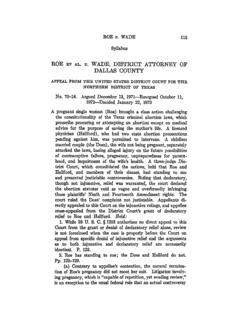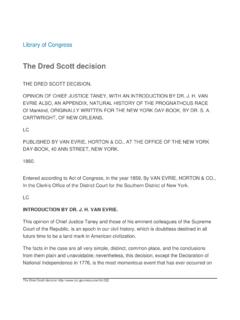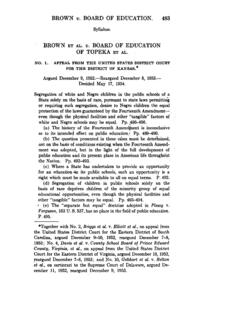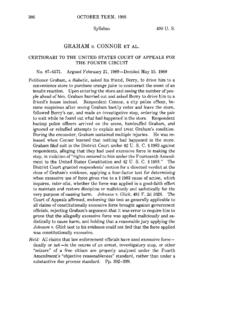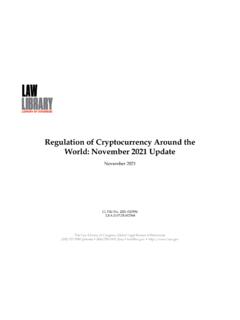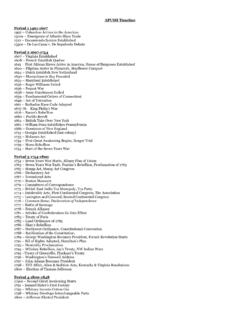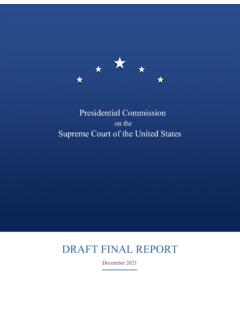Transcription of KATZ v. UNITED STATES. - Library of Congress
1 katz v. UNITED v. UNITED TO THE UNITED states COURT OF APPEALS FORTHE NINTH 35. Argued October 17, December 18, was convicted under an indictment charging him withtransmitting wagering information by telephone across state linesin violation of 18 U. S. C. 1084. Evidence of petitioner's endof the conversations, overheard by FBI agents who had attachedan electronic listening and recording device to the outside of thetelephone booth from which the calls were made, was introducedat the trial. The Court of Appeals affirmed the conviction, find-ing that there was no Fourth Amendment violation since therewas "no physical entrance into the area occupied by" :1. The Government's eavesdropping activities violated theprivacy upon which petitioner justifiably relied while using thetelephone booth and thus constituted a "search and seizure" withinthe meaning of the Fourth Amendment. Pp. 350-353.(a) The Fourth Amendment governs not only the seizureof tangible items but extends as well to the recording of oral state-ments.
2 Silverman v. UNITED states , 365 U. S. 505, 511. P. 353.(b) Because the Fourth Amendment protects people ratherthan places, its reach cannot turn on the presence or absence of aphysical intrusion into any given enclosure. The "trespass" doc-trine of Olmstead v. UNITED states , 277 U. S. 438, and Goldman states , 316 U. S. 129, is no longer controlling. Pp. 351, Although the surveillance in this case may have been so nar-rowly circumscribed that it could constitutionally have beenauthorized in advance, it was not in fact conducted pursuant tothe warrant procedure which is a constitutional precondition ofsuch electronic surveillance. Pp. F. 2d 130, Marks and Harvey A. Schneider argued thecause and filed briefs for TERM, of the Court. 389 U. S. Martin, Jr., argued the cause for the UnitedStates. With him on the brief were Acting SolicitorGeneral Spritzer, Assistant Attorney General Vinson andBeatrice JUSTICE STEWART delivered the opinion of petitioner was convicted in the District Court forthe Southern District of California under an eight-countindictment charging him with transmitting wagering in-formation by telephone from Los Angeles to Miami andBoston, in violation of a federal statute.
3 ' At trial theGovernment was permitted, over the petitioner's objec-tion, to introduce evidence of the petitioner's end of tele-phone conversations, overheard by FBI agents who hadattached an electronic listening and recording device tothe outside of the public telephone booth from whichhe had placed his calls. In affirming his conviction, theCourt of Appeals rejected the contention that the record-ings had been obtained in violation of the Fourth Amend-' 18 U. S. C. 1084. That statute provides in pertinent part:"(a) Whoever being engaged in the business of betting orwagering knowingly uses a wire communication facility for thetransmission in interstate or foreign commerce of bets or wagers orinformation assisting in the placing of bets or wagers on any sport-ing event or contest, or for the transmission of a wire communicationwhich entitles the recipient to receive money or credit as a resultof bets or wagers, or for information assisting in the placing of betsor wagers, shall be fined not more than $10,000 or imprisoned notmore than two years, or both.
4 "(b) Nothing in this section shall be construed to prevent thetransmission in interstate or foreign commerce of information foruse in news reporting of sporting events or contests, or for the trans-mission of information assisting in the placing of bets or wagerson a sporting event or contest from a State where betting on thatsporting event or contest is legal into a State in which such bettingis legal." katz v. UNITED Opinion of the , because "[tlhere was no physical entrance intothe area occupied by [the petitioner] " 2 We grantedcertiorari in order to consider the constitutional questionsthus presented.'The petitioner has phrased those questions as follows:"A. Whether a public telephone booth is a consti-tutionally protected area so that evidence obtainedby attaching an electronic listening recording deviceto the top of such a booth is obtained in violationof the right to privacy of the user of the F.]
5 2d 130, 386 U. S. 954. The petition for certiorari also challenged thevalidity of a warrant authorizing the search of the petitioner'spremises. In light of our disposition of this case, we do not reachthat find no merit in the petitioner's further suggestion that hisindictment must be dismissed. After his conviction was affirmed bythe Court of Appeals, he testified before a federal grand jury con-cerning the charges involved here. Because he was compelled totestify pursuant to a grant of immunity, 48 Stat. 1096, as amended,47 U. S. C. 409(l), it is clear that the fruit of his testimony cannotbe used against him in an), future trial. But. the petitioner asks formore. He contends that his conviction must be vacated and thecharges against him dismissed lest he be "subjected to [a] account of [a] ..matter ..concerning which he [was] com-pelled .. to testify .." 47 U. S. C. 409 (1). Frank v. UnitedStates, 347 F.
6 2d 486. We disagree. In relevant part, 409 (1)substantially repeats the language of the Compulsory Testimony Actof 1893, 27 Stat. 443, 49 U. S. C. 46, which was Congress ' responseto this Court's statement that an immunity statute can supplantthe Fifth Amendment privilege against self-incrimination only if itaffords adequate protection from future prosecution or v. Hitchcock, 142 U. S. 547, 585-586. The statutoryprovision here involved was designed to provide such protection,see Brown v. UNITED states , 359 U. S. 41, 45-46, not to conferimmunity from punishment pursuant to a prior prosecution andadjudication of guilt. Cf. Reina v. UNITED states , 364 U. S. 507, TERM, of the Court. 389 U. S."B. Whether physical penetration of a constitu-tionally protected area is necessary before a searchand seizure can be said to be violative of the FourthAmendment to the UNITED states constitution ."We decline to adopt this formulation of the the first place, the correct solution of Fourth Amend-ment problems is not necessarily promoted by incanta-tion of the phrase "constitutionally protected area.
7 "Secondly, the Fourth Amendment cannot be translatedinto a general constitutional "right to privacy." ThatAmendment protects individual privacy against certainkinds of governmental intrusion, but its protections gofurther, and often have nothing to do with privacy at provisions of the constitution protect personalprivacy from other forms of governmental the protection of a person's general right to privacy-his right to be let alone by other people '-is, like the4 "The average man would very likely not have his feelingssoothed any more by having his property seized openly than byhaving it seized privately and by stealth..And a person canbe just as much, if not more, irritated, annoyed and injured by anunceremonious public arrest by a policeman as he is by a seizure inthe privacy of his office or home." Griswold v. Connecticut, 381U. S. 479, 509 (dissenting opinion of MR. JUSTICE BLACK).5 The First Amendment, for example, imposes limitations upongovernmental abridgment of "freedom to associate and privacy inone's associations.
8 " naacp v. Alabama, 357 U. S. 449, Third Amendment's prohibition against the unconsented peace-time quartering of soldiers protects another aspect of privacy fromgovernmental intrusion. To some extent, the Fifth Amendment too"reflects the constitution 's concern for ..the right of eachindividual "to a private enclave where he may lead a privatelife."'" Tehan v. Shott, 382 U. S. 406, 416. Virtually everygovernmental action interferes with personal privacy to somedegree. The question in each case is whether that interferenceviolates a command of the UNITED states See Warren & Brandeis, The Right to Privacy, 4 Harv. L. (1890). katz v. UNITED Opinion of the of his property and of his very life, left largelyto the law of the individual states ."Because of the misleading way the issues have beenformulated, the parties have attached great significanceto the characterization of the telephone booth fromwhich the petitioner placed his calls.
9 The petitionerhas strenuously argued that the booth was a "constitu-tionally protected area." The Government has main-tained with equal vigor that it was But this effortto decide whether or not a given "area," viewed in theabstract, is "constitutionally protected" deflects atten-tion from the problem presented by this case.' For theFourth Amendment protects people, not places. Whata person knowingly exposes to the public, even in hisown home or office, is not a subject of Fourth Amend-ment protection. See Lewis v. UNITED states , 385 U. , 210; UNITED states v. Lee, 274 U. S. 559, 563. Butwhat he seeks to preserve as private, even in an areaaccessible to the public, may be constitutionally pro-See, e. g., Time, Inc. v. Hill, 385 U. S. 374. Cf. Breard v. Alex-andria, 341 U. S. 622; Kovacs v. Cooper, 336 U. S. In support of their respective claims, the parties have compiledcompeting lists of "protected areas" for our consideration.
10 It ap-pears to be common ground that a private home is such an area,Weeks v. UNITED states , 232 U. S. 383, but that an open field isnot. Hester v. UNITED states , 265 U. S. 57. Defending the inclu-sion of a telephone booth in his list the petitioner cites UnitedStates v. Stone, 232 F. Supp. 396, and UNITED states v. Madison,32 L. W. 2243 (D. C. Ct. Gen. Sess.). Urging that the telephonebooth should be excluded, the Government finds support in UnitedStates v. Borgese, 235 F. Supp. It is true that this Court has occasionally described its con-clusions in terms of "constitutionally protected areas," see, e. g.,Silverman v. UNITED states , 365 U. S. 505, 510, 512; Lopez v. UnitedStates, 373 U. S. 427, 438-439; Berger v. New York, 388 U. S. 41, 57,59, but we have never suggested that this concept can serve as atalismanic solution to every Fourth Amendment TERM, of the Court. 389 U. See Rios v. UNITED states , 364 U.
